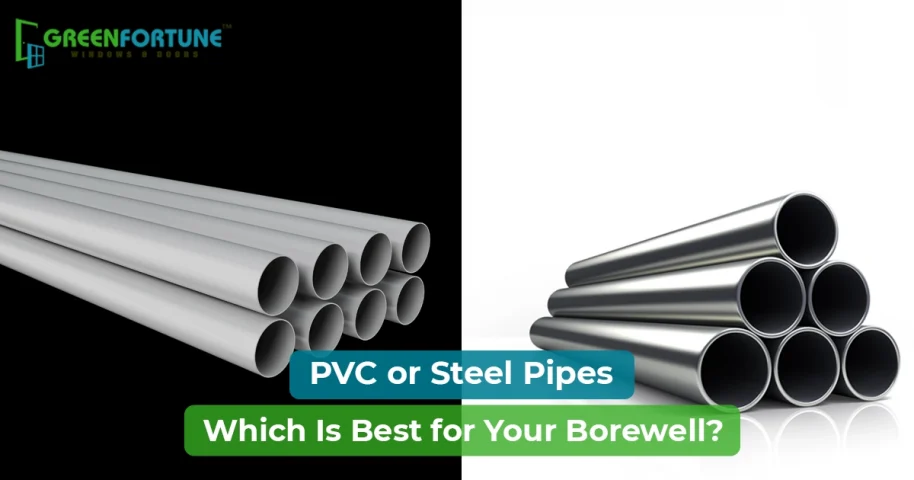
Top Balcony Tiles Ideas for a Beautiful & Durable Modern Home
May 16, 2025
From Maximalist To Minimalist: The Generational Shift In Using Wood As A Material
May 16, 2025Planning a Borewell? Don’t Miss This
Installing a borewell is exciting, but important steps can go wrong if they are skipped. Many people focus only on how deep to drill but forget one key point: using the right pipes.
Even with perfect drilling, poor-quality pipes can crack or leak. This can damage your borewell and lead to costly repairs or even failure.
The good news is, it's easy to avoid this. By choosing the right PVC pipes, drilling pipe lengths, fittings, and strong hose pipes, you can keep your borewell safe and working for years.
This blog shares simple tips to help you make the right choices and build a strong, long-lasting borewell.
Table of contents
- The Significance of Borewell PVC Pipes
- Borewell Drilling Pipe Length: Planning it Correctly
- Secure and Strong Borwell Pipe Fitting
- Types of Borewell Hose Pipes
- Things to Check When Choosing a Hose Pipe
- 250mm & 500mm Borewell PVC Pipe Variants: Sizes, Prices, and Applications
- How to Choose the Best Borewell Pipes?
- Common Mistakes to Avoid
- Conclusion
- Discover GreenFortune - Your Trusted Partner for Top-quality uPVC Windows and Doors
- FAQs
- 1. How deep can borewell PVC pipes go?
The Significance of Borewell PVC Pipes
Borewell PVC pipes are specially made to line the interior of borewells, creating a secure passage for water from underground to the surface without leakage or blockages.
PVC pipes have become the go-to choice today due to their versatility. Here are some of the reasons why PVC borewell pipes are important -
Resistance to corrosion: Poly pipes don't rot in the ground like metal ones do.
Lightweight: Our light and portable solutions make installation quick and simple, even in deep borewells.
Affordable: Lightweight poly pipes offer unbeatable value compared to heavy steel ones.
Strong and durable: Engineered to withstand underground pressure and soil movement.
Modern designs feature leak-proof joints.
Financial assistance: Investment in quality borewell pipes protects your borewell investment and ensures clean water will be available for many years to come.
Read more - Interlock brick design
Borewell Drilling Pipe Length: Planning it Correctly
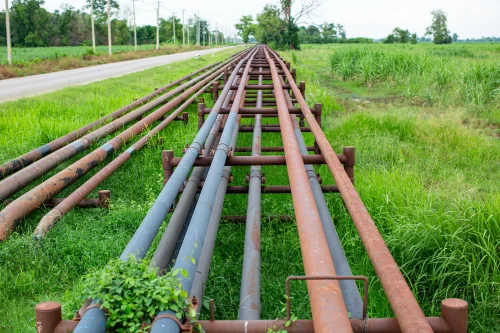
Establishing the ideal borewell drilling pipe length is vital to ensure an easy installation process.
Things You Should Know: Ongoing Lengths for Borewell PVC Pipes:
These typically come in 3-metre or 6-metre sections.
Depth of Borewell: To start, calculate the depth of your borewell and add extra for fittings or bends as required.
Finding the Right Class: Cascading pipes for borewells are typically divided into three classes: shallow depths (CS), medium depths (CM), and deep borewells (CD). Deeper wells require stronger pipes.
Custom-Cut Pipes: Androgynous Providers can supply custom-cut pipes if your site has specific needs.
If planned properly, borewell drilling pipe can save money while eliminating unnecessary waste and ensuring efficient borewell operations.
Secure and Strong Borwell Pipe Fitting
Proper borewell pipe fitting is just as crucial to its integrity as are its pipes themselves, helping create a system that remains strong and leak-free.
Common Borewell Pipe Fittings: Couplers (adaptors): These connectors connect two pipes securely.
Adapters: Incorporating adapters between pipe systems and borewell pumps allows users to connect both elements securely.
End Caps: To prevent debris from entering, close off pipe ends with end caps to keep out debris and protect their insides from dust accumulation.
Rubber Gaskets and O-rings: Provide a watertight seal between pipes. Always choose high-quality fittings that match the brand of borewell pipes you have. Incorrect or inferior fittings could result in leakage and compromise the borewell's structure, potentially leading to leaks that compromise its integrity.
Types of Borewell Hose Pipes
Here are some of the most common types of borewell hose pipes -
Suction Hose Pipes: Suck water directly into a pump from shallow borewells.
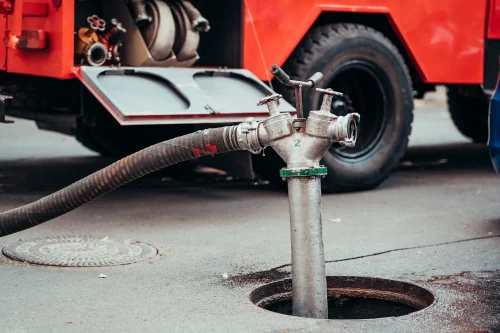
Delivery Hose Pipes: These move water from the pump outlet directly to its destination -- home, fields, or tanks.
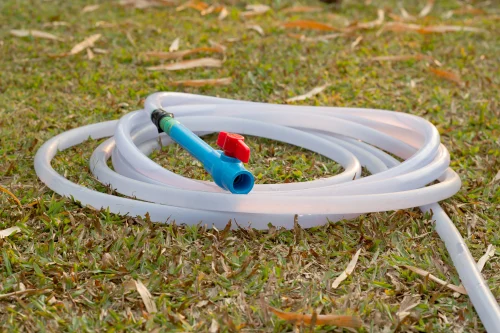
Things to Check When Choosing a Hose Pipe
Water resistance: Water resistance and bursting pressure are crucial considerations when purchasing a hose pipe. The pipe should meet these parameters without bursting under its own weight.
Material Strength: Your material should withstand sunlight, heat, and wear over time.
Diameter Size: It must match both the outlet of your pump and the borewell pipes for optimal results.
Choose a sturdy borewell hose pipe to ensure water flows freely without leaks or pipe bursts.
Read more - OTS in House
250mm & 500mm Borewell PVC Pipe Variants: Sizes, Prices, and Applications
When selecting borewell pipes, you will notice 250mm and 500mm variants. These indicate the pipe's wall thickness and strength.
250mm Borewell PVC Pipes:
- Dimensions:
250mm pipes are lighter with a medium wall thickness. They are suitable for borewells up to 100–150 feet deep. - Price Range:
Around ₹190–₹250 per metre, depending on brand and ISI certification. - Applications:
- Home water supply (domestic use)
- Shallow agricultural borewells
- Temporary water extraction systems
- Home water supply (domestic use)
- Strengths:
Affordable, easy to install, and good enough for non-rocky, soft soils.
500mm Borewell PVC Pipes:
- Dimensions:
500mm pipes have a thicker wall and are meant for deeper borewells (150 - 400 feet depth). - Price Range:
Around ₹320–₹400 per metre, based on quality and brand. - Applications:
- Deep domestic borewells
- Heavy-duty agricultural borewells
- Industrial or commercial water extraction
- Deep domestic borewells
- Strengths:
Stronger, higher pressure resistance, and longer lifespan - ideal for challenging underground conditions.
How to Choose the Best Borewell Pipes?
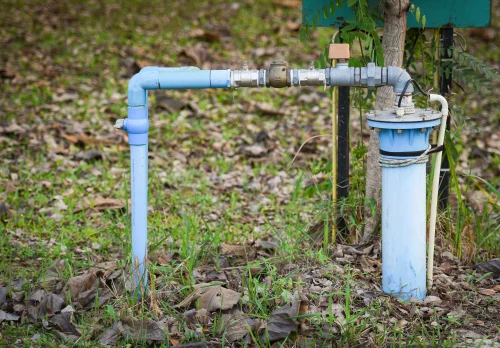
Before buying, run through this checklist:
- Match the pipe class to the borewell depth (CS, CM, CD)
- Select a diameter based on the pump size and water needs.
- Pick ISI-certified borewell pipes for assured quality.
- Decide between 250mm or 500mm thickness based on your project.
- Use matching, high-quality fittings and hose pipes.
- Buy from trusted brands only.
Good decisions at the start will save you from costly repairs later.
Common Mistakes to Avoid
Even with the best borewell installation plans in place, mistakes can arise that compromise its success:
Opting for cheap pipes: Whilst cheap pipes might appear attractive at first glance, their low quality can easily collapse under pressure and crack.
Error in selecting pipe class: A shallow pipe installed into a deep borewell could easily collapse under its own weight.
Intermixing different brands: Pipes and fittings from different brands may not fit properly together.
Neglecting Fitting Quality: Improper fittings cause leaks and weaken the borewell, potentially leading to leakage problems and weakening it over time.
Conclusion
By planning for optimal drilling pipe length, selecting fittings to accommodate different volumes (250mm or 500mm pipes), and finding appropriate hoses, you can ensure your borewell continues to operate without issue for many years.
Good pipes are more than an extra expense - they form the backbone of a reliable water supply. Invest once, and invest wisely.
Discover GreenFortune - Your Trusted Partner for Top-quality uPVC Windows and Doors
GreenFortune is your go-to solution for providing energy-efficient windows and doors with visual appeal, long-term performance, and premium comfort for your home improvement plans.
Green Fortune windows and doors, made with premium UPVC solutions specifically for each application, will add visual appeal and provide long-term performance.
Choose GreenFortune now and experience our extraordinary quality, design, and customer service.
FAQs
1. How deep can borewell PVC pipes go?
High-quality borewell pipes can reach depths of 400-500 feet when installed properly with matching casing types and according to proper procedures.
2. What are the differences between 250mm and 500mm borewell pipes?
250 mm pipes tend to be lighter for shallow wells, while 500mm pipes are thicker and stronger for use with deeper or rocky borewells.
3. Are Borewell Pipes Replaceable Without Re-drilling?
In most cases, no. If pipes become damaged, replacing or installing new ones usually necessitates costly re-drilling services and installation.

